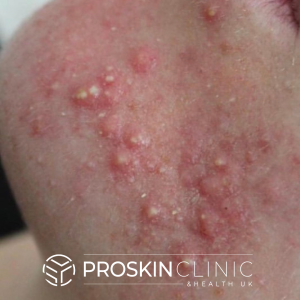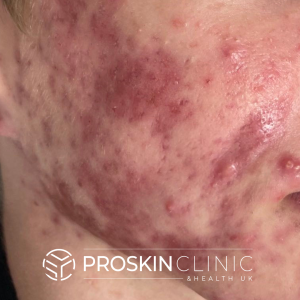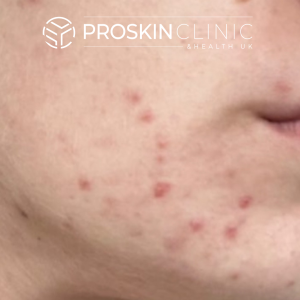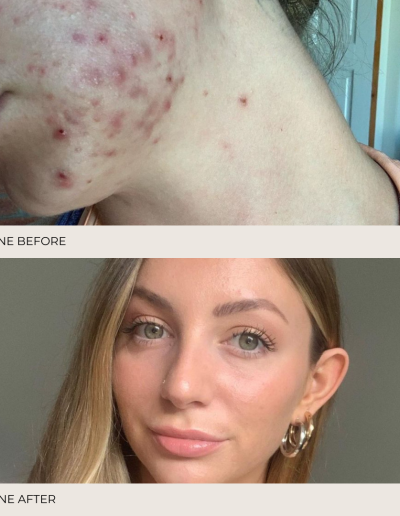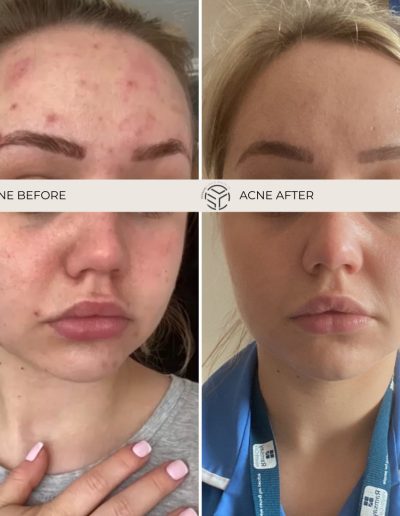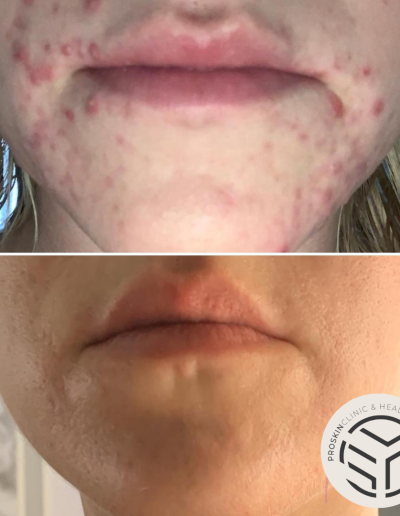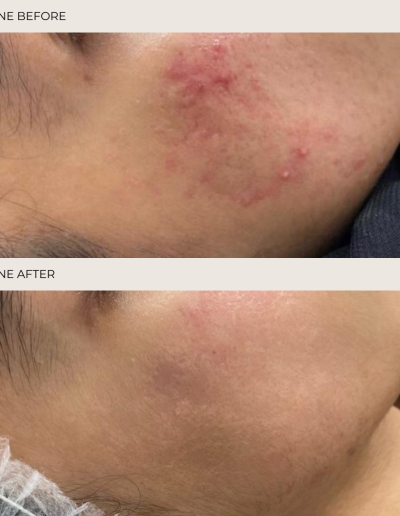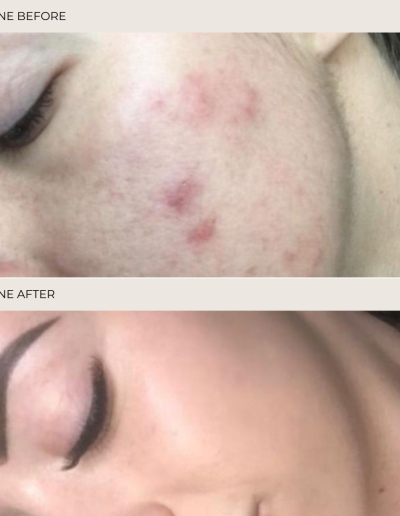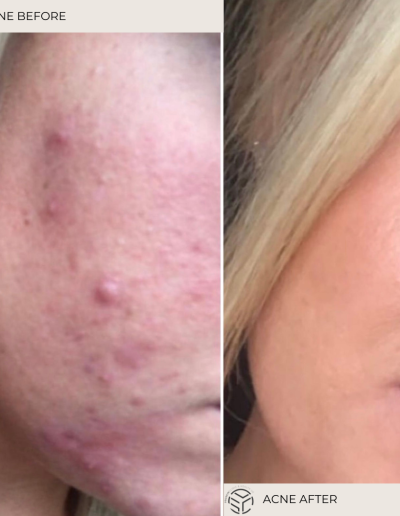Achieve Clearer Skin with Our Acne Management Program
Take Control of Your Acne at ProSkin Clinic & Health UK Ltd
Struggling with persistent acne? Our comprehensive Acne Management Program is designed to tackle acne at its roots, providing effective, long-term solutions.
Combining advanced treatments with personalised skincare advice, we’re dedicated to helping you achieve and maintain clear, healthy skin.
Why Choose Our Acne Management Program?
- Tailored treatment plans based on your unique skin type and acne severity.
- Utilises a combination of advanced therapies for maximum effectiveness.
- Focuses on not only treating existing acne but also preventing future breakouts.
Benefits of Our Program:
- Reduces the appearance of current breakouts.
- Targets underlying causes of acne to prevent recurrence.
- Improves overall skin health, texture, and appearance.
- Minimises the risk of acne scarring.
What is acne?
When the skin becomes clogged with dead skin cells, bacteria or oil it causes the skin to react which results in pustules, papules, and blackheads.
The pimples on the skin are filled with a white liquid called pus and can cause a lot of pain to some people.
The most common place to get acne is on the face, this is because the sebaceous glands on the skin are more prone to infection and this causes the red pustules and pores to become inflamed.
How common is Acne?
Acne is very common and affects almost everyone. It mostly affects teenagers and young adults as this is the prime time of hormonal changes, however, family history, is also a main factor.
Symptoms of acne
Each type of acne has its own symptoms; however, the generic symptoms of acne include:
- Papules – small bumps on the skin and can vary in colour, however, the most common colours are red or darker than the skin tone.
- Pustules – lumps on the skin filled with pus.
- Blackheads – these are clogged-up pores of the skin with a black top.
- Whiteheads – clogged up pores with a white top.
Causes of Acne
The main causes of acne are genetics and hormones.
Acne occurs due to hair follicles or pores becoming clogged. The skin has glands that empty into the hair follicles, however, when there is too much to filter through it becomes blocked.
It can be clogged with sebum (an oil that protects the skin), bacteria and dead skin cells. The skin sheds cells regularly allowing new cells to grow, when the skin cells shed, the dead skin can sometimes become trapped in the hair follicle, therefore, causing a blockage.
Once the follicle or pore is blocked it creates a papule and this then results in swelling, pain and inflammation.
Certain foods may trigger acne, foods with high sugar content, milk and whey protein. It is important to eat a balanced diet, with fruits, vegetables that are rich in vitamin C and beta-carotene to help encourage the skin to be healthy and reduce any inflammation to the skin.
types of acne
FUNGAL ACNE
This type of acne occurs as a result of infected hair follicles. When the follicle becomes infected this can create clusters of small papules, in all shapes, colours and sizes on the skin which can be itchy, inflamed and red.
When the papules get bigger, they turn into pustules and can have a yellow/green colour to them which indicates that they are now filled with pus. Anyone can obtain fungal acne, however, it is more common in males and teenagers, because they tend to have more surface oil in the area.
People who live in humid environments, have a weak immune system, individuals who exercise a lot and sweat more or who use a lot of oil-based moisturisers can have an increase in clogged follicles.
Fungal Acne risk can be caused by:
– Consistent rubbing or friction against the skin
– The skin being left moist/damp or hot
– Shaving
– Wearing restrictive clothing.
The most common areas for fungal acne are the chin, forehead, shoulders, chest, upper back, neck and upper arms.
Fungal Acne can be confused with common acne only because both acne types include inflammation of the hair follicles.
Common acne occurs when the follicle becomes blocked with deris, bacteria or oil and fungal acne is an infection in the follicle.
CYSTIC AND NODULAR ACNE
Deep papules that are filled with pus on the skin can be referred to as Cystic Acne. Being deep under the skin means that they can be more sensitive to pain and can grow larger. This type of acne is more prone to scarring.
Having too many dead skin cells and producing too much oil allows the bacteria to enter the skin and causes the pores to become inflamed. When this happens, the acne can become crusty, tender to the touch, and oozing with pus.
Cystic acne is more likely to affect teenagers, especially during hormonal changes. It can also occur in later in life for example, women transitioning through the menopause.
Nodular Acne – This type of acne is the most aggressive, it contains lumps under the skin alongside red lumps on the surface if the skin. These are not filled with pus or blackheads in the middle. Nodular acne can last for months and can be very painful. Cutibacterium is a type of bacteria that gets trapped under the skin and goes into the nodules, this then becomes inflamed and can result in infection.
Anyone is prone to getting this type of acne, however, is most common in young males after birth.
There are lots of different causes of nodular acne and it occurs when the pores become clogged and traps dead skin cells underneath the skin. The hair follicles and sebum become stuck, and this is when the pain and inflammation begin.
Contribution factors of Nodular acne are:
- Excess sweating, for example, wearing clothes against sweat or people who have a condition for extensive sweating.
- Genetics
- Hormones
- Medications
- Stress/anxiety
- Skincare products – using the wrong products and block the pores
Symptoms of nodular acne include firm lumps on the skin, these can be felt underneath the skin and normally appear on the face, chest and back in men from birth and jawline or chin with women. There can be a lot of pain in the area and the raised lumps can be red and inflamed or can sometime be the same colour as the skin.
To try and avoid getting nodular acne, keep the skin clear, using gentle cleansers, controlling stress levels and ensuring the skin is using the correct products.
Hormonal Acne
Hormonal acne can consist of papules, blackheads, pustules and cysts on the face, chest, shoulders and back. It affects adults more during the ages of 20-50 and is therefore also known as adult acne.
Papules become raised on the skin and are 2-5mm, whereas pustules are skin bumps that contain a white liquid called pus and range between 2-5mm. Cysts are sacs that have fluid, and they can appear anywhere in the body.
When hormones become imbalanced it can influence the skin to create an over production of sebum. The main reason for clogged pores are due to excess bacteria on the skin, the build-up of dead skin cells and the sebaceous glands creating too much oil.
Controlling your stress levels, how many hours of sleep you get and using the correct products can all contribute to how your skin changes and can control your hormone levels. However, there are certain causes that you cannot control, and this would be things such as family history of acne, side effects from medication (mainly steroids), any pre-existing medical conditions such as polycystic ovary syndrome and men undergoing testosterone treatment.
HOW DO YOU TREAT ACNE?
At ProSkin Clinic & Health Ltd we have an incredibly high success rate for acne clients and the results are life-changing.
Our Consultation Process
Step 1: Skin Assessment Submission Request
Kickstart your Acne transformation with a Skin Assessment.
Simply provide us with a few details about your skin concerns, and our clinicians will analyse your information to gain valuable insights into your skin’s needs.
Step 2: Personalised Consultation
Based on your Skin Assessment results, we’re thrilled to offer you an exclusive opportunity for a bespoke Consultation with our highly trained, expert Clinician.
During this one-on-one session, our professionals will assess your skin, analyse its current condition, and identify any underlying issues.
We’ll provide you with valuable insights, knowledge and recommendations, provide you with tailored professional grade product, supplementation and treatment advice only available through our Clinic Prescription, along with lifestyle adjustments, skincare routines that suit your individual needs and develop a tailored plan just for you.
Step 3: Customised Skincare Solutions
Following your consultation, our experts will curate a customised skincare regimen designed specifically for your skin type, concerns, and goals.
We will recommend a selection of our premium professional products and treatments, ensuring that you have all the tools you need to achieve your desired results formulated in a bespoke skin plan and sent directly to your inbox.
Step 4: Ongoing Support and Guidance At ProSkin Clinic & Health UK
We believe in providing comprehensive care even beyond the consultation.
Our team will be there to support you throughout your skincare journey, offering expert advice, answering your questions, and adjusting your regimen as needed to optimise your results.
Step 5: Book Your Skin Consultation
Ready to experience the ProSkin Acne Management plan? Take the next step and book your Skin Consultation now.
Our friendly team are standing by to assist you and ensure you receive the exceptional service you deserve.
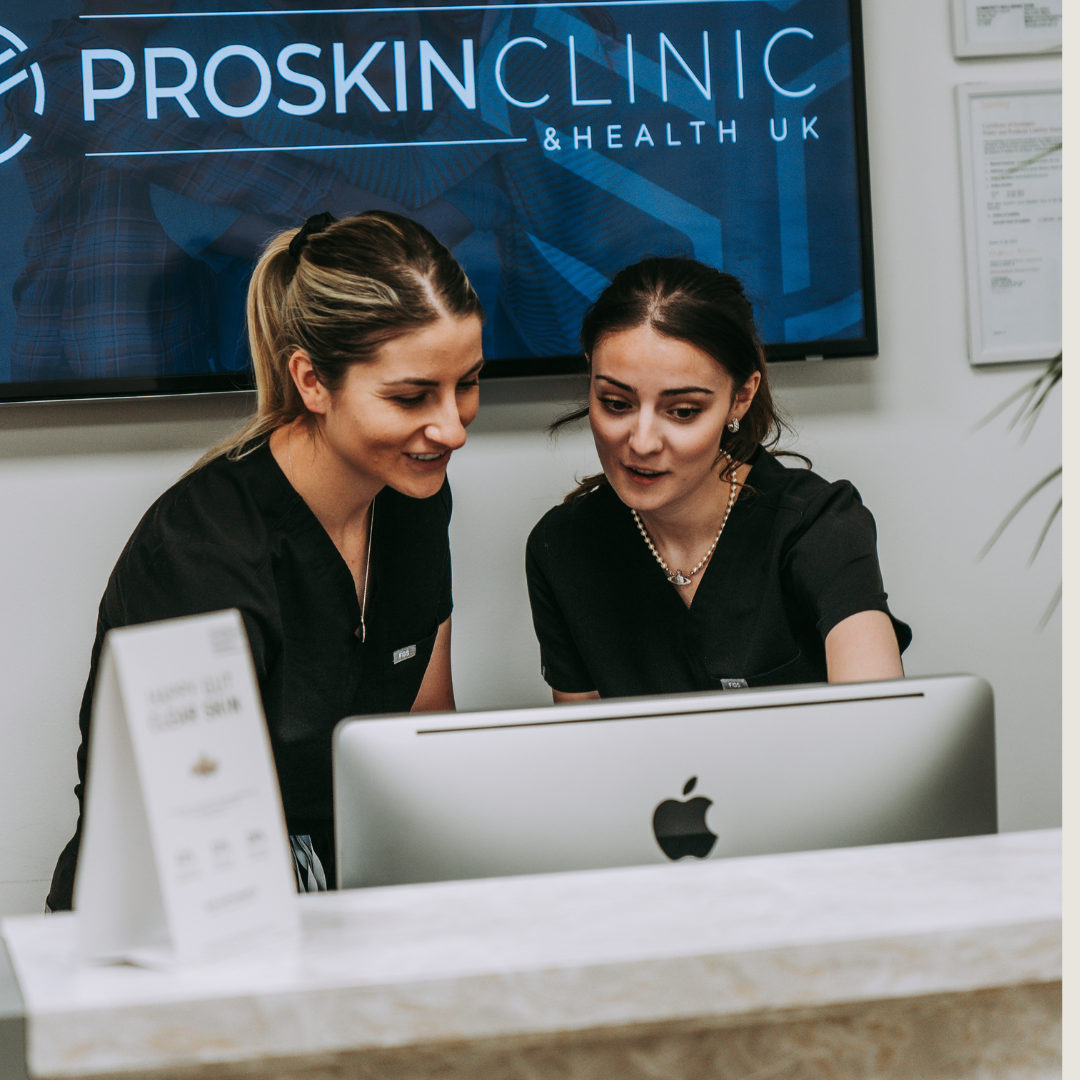
Request a Call Back.
At ProSkin Clinic & Health UK Ltd, your skin’s health are our top priority. If you’re considering one of our treatments but have questions or need guidance, we’re here to help. Request a callback, and let’s start your journey to amazing skin together.
How It Works:
- Fill out a simple form with your name, contact information, and a brief message about your skincare needs.
- Our expert team will review your enquiry and get back to you promptly.
- We’ll provide detailed information and can even set up a consultation appointment for you.
ProSkin Clinic & Health UK Promise.
INTEGRITY.
At the core of our approach is unwavering integrity. We hold honesty, openness, and transparency as paramount values as we pursue our goals, all while remaining firmly within the bounds of our professional practice.
EMPATHY.
Irrespective of background or condition, we extend a profound sense of empathy and understanding to our clients. We recognise their unique challenges, pain points, and the ways these factors can profoundly impact their well-being and day-to-day lives.
SERVICE QUALITY AND EXCELLENCE.
Our commitment revolves around consistently surpassing client service expectations. We aspire not just to meet but to excel in our delivery of services, ensuring the highest level of quality in everything we do.
COMMUNITY BUILDING.
We regard ourselves as a closely-knit family. We are dedicated to fostering robust support networks and knowledge-sharing across the nation. Through these connections, we aim to create a unified and strong community.
PASSION FOR TRANSFORMATION.
In doing so, we inspire not only ourselves but also others, fostering a collective commitment to going the extra mile to deliver the gift of skin confidence to individuals nationwide.

